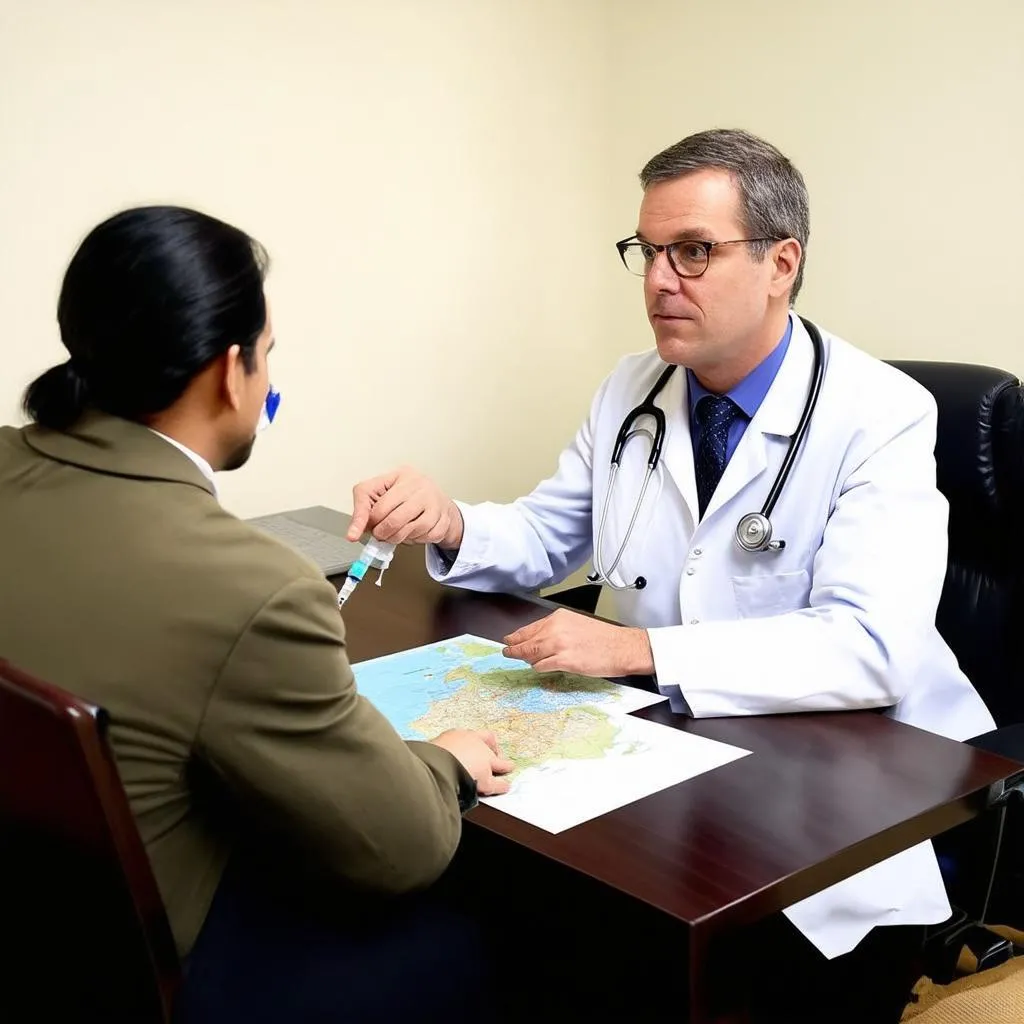Remember that time you were exploring the ancient ruins of Rome, and a fellow traveler had a nasty bout of heatstroke? Or when you were trekking through the lush Amazon rainforest, and someone tripped and sprained their ankle? In those moments, wouldn’t it be incredible to have the skills to help? That’s the allure of being a travel doctor – the perfect blend of adventure and medical expertise.
But is it really possible to combine your love for travel with your medical profession? Let’s delve deeper!
What Does a Travel Doctor Do?
A travel doctor, in essence, is a medical professional who provides healthcare services to individuals while they’re traveling. This could involve:
- Pre-travel consultations: Advising on vaccinations, necessary medications, and health precautions for specific destinations. For instance, if you’re heading to a country where malaria is prevalent, like Thailand, a travel doctor can guide you on the right antimalarial medication.
- Treating travel-related illnesses: Diagnosing and treating conditions like traveler’s diarrhea, altitude sickness, or infections picked up during the journey.
- Providing emergency medical care: This might involve stabilizing a patient before transferring them to a local hospital or even performing minor surgical procedures in remote locations.
Imagine being able to offer medical aid during a medical mission trip to Nepal or volunteer at a health clinic in rural Guatemala. Being a travel doctor opens up a world of opportunities to make a real difference.
How to Become a Travel Doctor: Charting Your Course
While the path to becoming a travel doctor might seem as exciting as the journey itself, it requires dedication and a well-defined plan.
- Solid Medical Foundation: The first step is obtaining a medical degree (MD or DO) from an accredited medical school. This typically involves four years of intensive study and clinical rotations.
- Residency & Specialization (Optional): After medical school, you’ll complete a residency program in a chosen specialty like emergency medicine, family medicine, or internal medicine. Specializing isn’t mandatory, but it can enhance your skills and credibility in the travel medicine field.
- Travel Medicine Certification: While not always required, becoming certified in travel medicine demonstrates your expertise to potential employers or clients. The International Society of Travel Medicine (ISTM) and the American Society of Tropical Medicine and Hygiene (ASTMH) are reputable organizations offering certifications.
Essential Skills for Travel Doctors: Beyond the Stethoscope
Being a travel doctor demands more than just medical knowledge. Here are some crucial skills that will help you thrive:
- Adaptability: From bustling cities to remote villages, you’ll encounter diverse environments and medical challenges. Being adaptable is key to navigating these situations effectively.
- Cultural Sensitivity: You’ll interact with people from different cultures and backgrounds. Respecting their customs and beliefs is essential for building trust and providing patient-centered care.
- Resourcefulness: In remote areas, you might have limited access to advanced medical equipment. Being resourceful and finding creative solutions with limited resources is crucial.
Is Being a Travel Doctor Right for You?
This career path is as rewarding as it is demanding. Ask yourself these questions:
- Are you passionate about both medicine and travel?
- Can you handle unpredictable situations and make quick decisions?
- Are you comfortable working independently and in diverse settings?
If you answered yes, then becoming a travel doctor might be your calling!
Travel Doctor vs. Travel Nurse: Understanding the Difference
While both professions involve providing healthcare to travelers, there are key differences:
- Scope of Practice: Travel doctors have a broader scope of practice, including diagnosing and treating illnesses, prescribing medications, and performing minor procedures. Travel nurses, on the other hand, typically focus on providing direct patient care, administering medications, and assisting physicians.
- Education & Training: Travel doctors have a medical degree and have completed a residency program, while travel nurses typically have a nursing degree (ADN or BSN) and relevant nursing experience.
 Travel doctor consulting a patient
Travel doctor consulting a patient
Exploring Your Options: Where Can Travel Doctors Work?
The world becomes your oyster as a travel doctor! Here are some exciting possibilities:
- International Aid Organizations: Organizations like Doctors Without Borders (MSF) and the Red Cross offer opportunities to provide medical aid in crisis zones and developing countries. Imagine working in a field hospital in war-torn Yemen or providing healthcare in the wake of a natural disaster in Haiti.
- Government Agencies: The Centers for Disease Control and Prevention (CDC) and the World Health Organization (WHO) employ travel medicine specialists for disease surveillance, outbreak investigations, and global health initiatives.
- Private Companies: Many private companies, especially those with employees traveling internationally, hire travel doctors for pre-travel consultations and on-site medical support.
The Perks of Being a Travel Doctor: Beyond the Horizon
Choosing this career path comes with unique advantages:
- Adventure & Exploration: Imagine treating patients while sailing the Galapagos Islands or providing medical care during a safari adventure in Tanzania. You’ll have the chance to experience diverse cultures and witness breathtaking landscapes firsthand.
- Making a Difference: Whether you’re providing medical aid in underserved communities or helping travelers stay healthy, you’ll directly impact people’s lives.
- Professional Growth: Working in diverse environments and facing unique medical challenges will continually test your skills and push you to learn and grow as a medical professional.
 Travel doctor trekking in the mountains with medical supplies
Travel doctor trekking in the mountains with medical supplies
Planning Your Journey: Tips for Aspiring Travel Doctors
Here are some tips to guide you on your journey:
- Network with Professionals: Attend travel medicine conferences, connect with experienced travel doctors, and join professional organizations like ISTM and ASTMH.
- Volunteer or Shadow: Gain valuable experience by volunteering at a travel clinic or shadowing a travel doctor to understand the nuances of the field.
- Embrace Continuous Learning: Stay updated on the latest travel advisories, disease outbreaks, and advancements in travel medicine.
Conclusion: Embark on Your Adventure
Becoming a travel doctor is an incredible way to combine your passion for medicine with your love for exploring the world. It’s a challenging yet rewarding path that allows you to make a real difference while experiencing the beauty and diversity our planet offers. So, pack your stethoscope and your sense of adventure – the world awaits!
Have you ever considered a career in travel medicine? Share your thoughts and experiences in the comments below!
For more travel-related insights and resources, visit travelcar.edu.vn.
Don’t forget to check out our other informative articles:
Embark on a fulfilling career path that satisfies your wanderlust and your desire to heal. The journey of a travel doctor awaits!